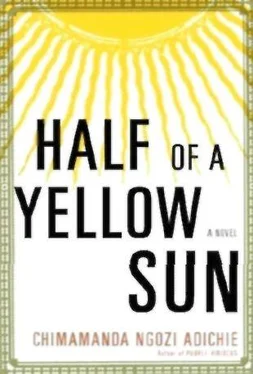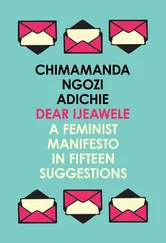Richard laughed at the jokes. He tried, too, not to drift throughout the conversations, not to show how awkward he felt. He preferred talking to the women, although he had learned not to spend too long with a particular woman, or Susan would throw a glass at the wall when they got home. He was baffled the first time it happened. He had spent a short time talking to Clovis Bancroft about her brother's life as a district commissioner in Enugu years ago, and afterward Susan was silent during the drive back in her chauffeur-driven car. He thought perhaps she was dozing off; it had to be why she was not talking about somebody's ghastly dress or the unimaginative hors d'oeuvres that had been served. But when they got back to her house, she picked up a glass from the cabinet and threw it against the wall. "That horrible little woman, Richard, and right in my face too. It's so awful!" She sat on the sofa and buried her face in her hands until he said he was very sorry, although he was not quite sure what he was apologizing for.
Another glass crashed some weeks later. He had talked to Julia March, mostly about her research on the Asantehene in Ghana, and stood absorbed, listening, until Susan came over and pulled him by the arm. Later, after the brittle splinter of shattering glass, Susan said she knew he didn't mean to flirt but he must understand that people were horribly presumptuous and the gossip here was vicious, just vicious. He had apologized again and wondered what the stewards who cleaned up the glass thought.
Then there was the dinner at which he talked about Nok art with a university lecturer, a timid Yoruba woman who seemed to feel just as out of place as he did. He had expected Susan's reaction and prepared to apologize before she got to the living room, so that he could save a glass. But Susan was chatty as they were driven home; she asked if his conversation with the woman had been interesting and hoped he had learned something that would be useful for his book. He stared at her in the dim interior of the car. She would not have said that if he had been talking to one of the British women, even though some of them had helped write the Nigerian constitution. It was, he realized, simply that black women were not threatening to her, were not equal rivals.
Aunt Elizabeth had said that Susan was vivacious and charming, never mind that she was a little older than he was, and had been in Nigeria for a while and could show him round. Richard did not want to be shown round; he had managed well on his past trips abroad. But Aunt Elizabeth insisted. Africa was nothing like Argentina or India. She said Africa in the tone of one repressing a shudder, or perhaps it was because she did not want him to leave at all, she wanted him to stay in London and keep writing for the News Chronicle. He still did not think that anybody read his tiny column, although Aunt Elizabeth said all her friends did. But she would: The job was a bit of a sinecure after all; he would not have been offered it in the first place if the editor were not an old friend of hers.
Richard did not try to explain his desire to see Nigeria to Aunt Elizabeth, but he did accept Susan's offer to show him around. The first thing he noticed when he arrived in Lagos was Susan's sparkle, her posh prettiness, the way she focused entirely on him, touched his arm as she laughed. She spoke with authority about Nigeria and Nigerians. When they drove past the noisy markets with music blaring from shops, the haphazard stalls of the street-side hawkers, the gutters thick with moldy water, she said, "They have a marvelous energy, really, but very little sense of hygiene, I'm afraid." She told him the Hausa in the North were a dignified lot, the Igbo were surly and money-loving, and the Yoruba were rather jolly even if they were first-rate lickspittles. On Saturday evenings, when she pointed at the crowds of brightly dressed people dancing in front of lit-up canopies on the streets, she said, "There you go. The Yoruba get into huge debt just to throw these parties."
She helped him find a small flat, buy a small car, get a driver's license, go to the Lagos and Ibadan museums. "You must meet all my friends," she said. At first, when she introduced him as a writer, he wanted to correct her: journalist, not writer. But he was a writer, at least he was certain he was meant to be a writer, an artist, a creator. His journalism was temporary, something he would do until he wrote that brilliant novel.
So he let Susan introduce him as a writer. It seemed to make her friends tolerate him, anyway. It made Professor Nicholas Green suggest he apply for the foreign research grant at Nsukka, where he could write in a university environment. Richard did, not only because of the prospect of writing in a university but also because he would be in the southeast, in the land of Igbo-Ukwu art, the land of the magnificent roped pot. That, after all, was why he had come to Nigeria.
He had been in Nigeria for a few months when Susan asked if he would like to move in with her, since her house in Ikoyi was large, the gardens were lovely, and she thought he would work much better there than in his rented flat with the uneven cement floors where his landlord moaned about his leaving his lights on for too long. Richard didn't want to say yes. He didn't want to stay much longer in Lagos. He wanted to do more traveling through the country while waiting to hear back from Nsukka. But Susan had already redecorated her airy study for him, so he moved in. Day after day, he sat on her leather chair and pored over books and bits of research material, looked out the window at the gardeners watering the lawn, and pounded at the typewriter, although he was aware that he was typing and not writing. Susan was careful to give him the silences he needed, except for when she would look in and whisper, "Would you like some tea?" or "Some water?" or "An early lunch?" He answered in a whisper too, as if his writing had become something hallowed and had made the room itself sacrosanct. He did not tell her that he had written nothing good so far, that the ideas in his head had not yet coalesced into character and setting and theme. He imagined that she would be hurt; his writing had become the best of her hobbies, and she came home every day with books and journals from the British Council Library. She saw his book as an entity that already existed and could therefore be finished. He, however, was not even sure what his subject was. But he was grateful for her faith. It was as if her believing in his writing made it real, and he showed his gratitude by attending the parties he disliked. After a few parties, he decided that attending was not enough; he would try to be funny. If he could say one witty thing when he was introduced, it might make up for his silence and, more important, it would please Susan. He practiced a droll self-deprecating expression and a halting delivery in front of the bathroom mirror for a while. "This is Richard Churchill," Susan would say and he would shake hands and quip, "No relation of Sir Winston's, I'm afraid, or I might have turned out a little cleverer."
Susan's friends laughed at this, although he wondered if it was from pity at his fumbling attempt at humor more than from amusement. But nobody had ever said, "How funny," in a mocking tone, as Kainene did that first day in the cocktail room of the Federal Palace Hotel. She was smoking. She could blow perfect smoke rings. She stood in the same circle as he and Susan, and he glanced at her and thought she was the mistress of one of the politicians. He did that with the people he met, tried to guess a reason for their being there, to determine who had been brought by someone. Perhaps it was because he would not have been at any of the parties if it wasn't for Susan. He didn't think Kainene was some wealthy Nigerian's daughter because she had none of the cultivated demureness. She seemed more like a mistress: her brazenly red lipstick, her tight dress, her smoking. But then she didn't smile in that plastic way the mistresses did. She didn't even have the generic prettiness that made him inclined to believe the rumor that Nigerian politicians swapped mistresses. In fact, she was not pretty at all. He did not really notice this until he looked at her again as a friend of Susan's did the introductions. "This is Kainene Ozobia, Chief Ozobia's daughter. Kainene's just got her master's from London. Kainene, this is Susan Grenville-Pitts, from the British Council, and this is Richard Churchill."
Читать дальше












